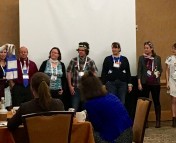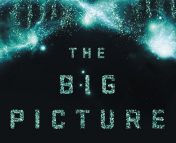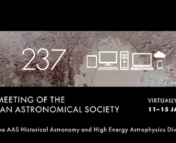Conferences are a hugely important part of the career of academics in all fields, they’re where you go to meet future collaborators and share your ideas and recent papers so people know about the work you’re doing. However, because of the Covid-19 Pandemic, academic conferences have had to either be cancelled or transition to being online to continue.
Having attended a variety of virtual conferences during the last year, I noticed a huge range of how the success rate of transitioning to an online format. The Cosmology from Home conference, a conference designed to be online from the start and geared towards the global population of cosmologists, has been the most successful online conference I’ve attended.
I sat down with some of three of the organisers for the Cosmology from Home 2021 conference—Shaun Hotchkiss, Niko Šarčević, and Benjamin Wallisch—to talk about the sorts of things they considered when designing this online conference. This conference started as a trial workshop, called CosmoConβ, with around 40 attendants, in April of 2020. So while this conference began during the pandemic, the planning and motivation to start it had begun pre-pandemic. Cosmology from Home 2020 took place in August of 2020, and it has since grown to ~400 participants in the 2021 instalment.
What was the motivation for designing Cosmology from Home, since this was planned pre-pandemic?
One reason some academics are pushing for a higher proportion of conferences to be moved online is environmental factors which would help curb the carbon footprint of academic life. The organisers of Cosmology from Home do cite this as one motivation, though not their primary one. Shaun says “more than anything, it was literally just: these tools are there, and there is a possibility that if you ran an online conference it’s a lot cheaper and people can come from all over the world on a much shorter timeframe…at that point I’d attended a few versions of what people might have called online conferences then and they just, didn’t work…I figured that even with a little thought one would be able to come up with a better thing.”
The other organisers also cite the accessibility of the online format as being the primary motivation. Part of the conference design is to have two sessions, an early session from 14:00–17:00 UTC and a late session from 00:00–2:30 UTC. Ben Wallisch adds “given our two session, we can essentially reach the global cosmology population. For some it might be slightly odd times, but in principle everyone is able to [attend], in addition with the recordings of talks being done beforehand…in that sense, geographic diversity is another aspect that has certainly been on my mind.”
Niko adds “as someone who comes from a poor background…an opportunity to attend something like this, with all of the [cosmology] community is great. For me it’s the inclusivity 100%…and the potential to be really global… though obviously the environmental [benefit] goes without saying.”
What makes Cosmology from Home work? What did you consider when designing it?
Shaun describes the thought process that went into designing this novel conference format.
“The first question I asked myself was: what do I get from an in person event? Not what happens [at an in person event]…what are the things that after the conference have added value to me?…We didn’t just copy and paste from the real in person conferences, what we copied and pasted was the motivation, not the format.”
Ben adds how these ideas are actually implemented in the conference, organised into 3 key pillars.
- Pillar 1: all talks are pre-recorded. Participants can watch them in their own time, so that no one is stuck on Zoom for hours in webinars. This means that people are only in video meetings for discussion, which tries to combat the fatigue that comes with sitting at a screen all day. Shaun describes this element of online conferences as “absolutely critical.”
- Pillar 2: asynchronous discussions. This allows people to go away and think of good questions and good answers in their own time, which can lead to a less hostile atmosphere in questioning, and allows people in a broad range of timezones to contribute.
- Pillar 3: direct/live interactions. Cosmology from Home does this using a platform called Sococo, which allows people to move avatars around a virtual space. People join the scheduled discussions by entering the appropriate room in the virtual space which leads them to the video meeting, and are encouraged to continue discussions in scheduled “informal discussion” sessions and other times between scheduled sessions.
The use of the virtual office space attempts to combat an issue common in many online conferences. Shaun describes this issue:
“The coffee time [at an in person event] you get this kind of organic interaction, why is that happening? It’s happening because you’re standing there in a room and you’ve got nowhere else to go, you can see what conversations are happening and who’s participating, [but in a virtual setting] you can’t just [leave] the participants [in the Zoom meeting] and be like “okay now we’re going to do this thing called coffee break. Why aren’t you doing what people do on coffee break, we even called it coffee break and gave you 15 minutes, why aren’t you interacting, why have you turned off your computers?”
The idea behind forcing all participants to enter the live sessions through the virtual office is to try to replicate the “lack of escape” that happens during an in person conference, where once the participants leave the session they can still see all the other participants and who is talking to whom. While this isn’t a perfect system, and I’ve spoken to several participants at the conference who don’t use the virtual office beyond just joining the main meetings, I’ve also spoken to participants who have found it very helpful and made good use of the space. While the organisers of this conference tried several different platforms and settled on Sococo, there are similar platforms that have proven successful in other formats.
What lessons have you learned from the trial conference and last year’s instalment of Cosmology from Home?
The principle lessons that the organisers cite are that establishing new social norms for the online space and that organising around multiple timezones is “an absolute beast” of a problem to solve.
One such social norm that is enforced during the conference is in the asynchronous discussions, which take place on Slack. The rule is to stick to “one topic per thread” where people ask questions or suggest topics for discussions and all discussion on that topic happens under that comment. As Shaun describes “this stops the Slack from being this Twitter-like stream of gibberish that everyone hates and turns it into a resource that will be valuable 3 years from now.”
At the beginning of the first conference, in 2020, the organisers say they had to send reminder messages regarding Slack etiquette every 10 to 20 minutes in the first few days, whereas this year, the norm has been set by people who attended last year leading by example. Quite how much of a role this has had in making the asynchronous discussion successful came as a pleasant surprise.
For the timezones, the format of having two sessions, with plenary and parallel talks in both, is the main way the organisers try to make the conference accessible to everyone, supplemented with the asynchronous discussion. Shaun says “the late session talk discussion[s] work reasonably well I think. They aren’t as well-attended as the early ones [. . .] because the early ones are kind of a prime time zone for Europe and North America, where most of the attendants are. The reason they work I think, is that the speaker is the expert on the topic they recorded their talk on, anyone who wants to ask questions on that topic has to talk to the speaker then.” In contrast, he says that “the themed discussions in the late sessions just do not work.” Themed discussions are time set aside at the beginning of the conference to discuss a topic, but the topic is not decided ahead of time, it is suggested dynamically by the participants during the conference.
The scope for outreach at virtual conferences is also significantly larger than in person conferences. At Cosmology from Home 2020 a few outreach events were run during the conference, both a Reddit AMA and a YouTube livestream with cosmologists answering questions from the public. As Shaun puts it “the potential scope for an outreach event is just vastly larger, in terms of reach for an online event than in person.” Because of this, in addition to the outreach events from the 2020 conference, the 2021 installment held livestreams throughout the week where scientists would recap major events that happened during the conference.
Takeaways
While there are significant challenges to implementing a successful online conference, the need to learn how to do so is crucial going forward into the future. Even when large scale international travel becomes safe again, the role of online conferences will likely continue to feed into the landscape of academic work, both for environmental and accessibility reasons. It is important that the people who organise these spaces think carefully about why they choose a particular structure for the conference, and take the opportunities to experiment and redesign how these events work. While Cosmology from Home isn’t perfect, it has been the most coherent and enjoyable online conference that I have been to in the last 18 months, so I hope that the lessons from the organisers can be used in other events going forward.
Links and people
If you’re interested in learning more about how this conference is structured, you can visit the format page of their website or contact the organisers. While I only spoke to a few of the people involved, the full list of people responsible for setting up this conference can be found below.
Organizers 2021: Marika Asgari, Shaun Hotchkiss, Niko Šarčević, Mariana Vargas-Magaña, Benjamin Wallisch, Matthijs van der Wild
Advisors 2021: Jo Dunkley, Richard Easther, Juan García-Bellido, Hendrik Hildebrandt, Amanda Weltman, Yuanyuan Zhang
Organizers 2020: Shaun Hotchkiss, Niko Šarčević, Benjamin Wallisch, Matthijs van der Wild, Yuanyuan Zhang
Advisors 2020: Richard Easther, Juan García-Bellido, Amanda Weltman
Organizers CosmoConβ: João Caldeira, Shaun Hotchkiss, Niko Šarčević, Tommi Tenkanen, Benjamin Wallisch, Graham White, Matthijs van der Wild, Yuanyuan Zhang (with additional input from Knud Jahnke as a CosmoConβ advisor)
Feature image credit: Fabrice Villard on Unsplash
Edited by: Catherine Manea




